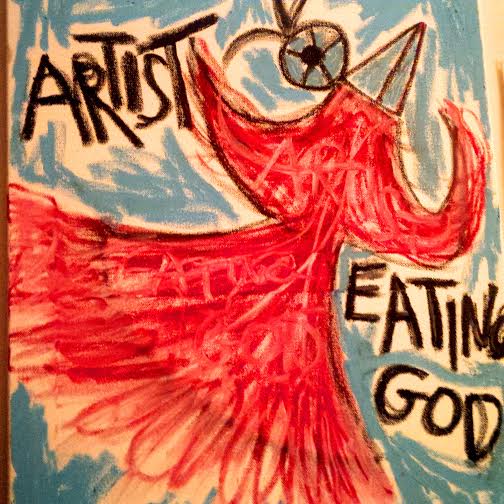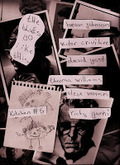Three Versions of the Moon Landing
1. Mythopoeic:
Crab—who was the center of everything—said to Mango: “Why is it that you do not turn your countenance towards me so that you may genuflect in my direction all of the time?” “My lord,” responded Mango cleverly, “if I were to face you from the same angle all of the time, I would soon go completely blind on that side, as your illuminating limbs are so very bright. I, therefore, rotate so that all of my surface can be within your sight at least part of the time.” Crab thought about this, and then proffered a claw towards Mango. The claw opened and a small Hummingbird fluttered out and began flying in circles around the elliptical fruit, whose own rotation was influenced by the bird’s concentric itinerary. Soon an intrepidly dialectical relationship evolved where the hummingbird pulled the softer parts of the larger object towards its orbital apogee, even as it was reacting to the wobbly peregrinations of Mango’s gravitational vortex. The relationship grew so close that it was inevitable that at some point they should achieve a greater level of intimacy. One day, with little advance warning, Mango spit an infinitesimally small seed capsule in the direction of Hummingbird during a particularly close pass. Hummingbird asked Mango why he was suddenly compelled to share a part of himself in this way. Mango responded that his seeds had become rather moldy and had grown into forms too strange and numerous to comprehend; and, that he believed it was time to share his unique malady with his neighbor, who was extremely clean and bereft of the tissue thin residue which provided a germination ground for such odd growths. The seeds temporarily embedded themselves in Hummingbird’s feather-layers, before being dislodged and finding their way back to Mango’s more generous range of organic possibilities. “I’m sorry that you didn’t find my tiny animalcules to your liking,” said Mango. “It isn’t that,” replied Hummingbird, “I just don’t know exactly what an ‘animalcule’ is, or whether such substances can be spread through casual contact.” Mango subsequently noticed that his companion had been orbiting at a greater distance than usual. “Well,” he sighed, “apparently certain things cannot be shared so easily.” It would be some time before either party would refer back to that event.
2. Theatrical:
Hermit: I can see you staring at me through the foliage. Do come out and state your intentions.
Lunatic: I watch you so that I can have an example to follow.
Hermit: Follow someone else’s example. There are other hermits in this valley who have more to offer.
Lunatic: But none of them are as creative in how they have decorated their huts.
Hermit: My hut is adorned with leaves and fruits and as a result has become over-run by aphids.
Lunatic: What is an aphid?
Hermit: You have never seen an aphid? It is a tiny insect that feeds on leaves.
Lunatic: I have never seen one—can you describe them?
Hermit: I have a better idea.
The hermit moves away from the window, and goes rummaging through his hut. The lunatic can hear rustling and banging, but does not know what his counterpart is doing. Momentarily, the hermit returns to the open window, holding a small piece of bamboo in his hand. He sticks something tiny into one end of the bamboo tube and brings the hollow cylinder up to his mouth as if he is going to inhale the object right through the piping. Instead, he blows breath through the tube, and a small projectile emerges which hits the lunatic in the cheek, causing him to wince momentarily in pain.
Hermit: Do you see what they look like now?
Lunatic: Was it necessary to shoot one at me, in such a fashion?
Hermit: I did it so that you could feel as well as see the impact that they have had on my world. They are the result of a process that occurs when leaf matter begins to rot and fester. They are a plague.
Lunatic: how can something so tiny be compared to a pox?
Hermit: Take the tiny creature from your hand, put it on your head, and cover it with a hat. Come back in two months and ask me the same question.
3. Allegorical:
Sulu and Ohura were walking through the jungle and had not seen anyone else for several days. While scrounging under lichen encrusted rocks by a muddy stream, Sulu said to his partner: “here, take this, it’s a small green stone that emits a funny smell because of a mold that grows along microscopic cracks on its interior; it will help you find a drinkable trickle of water, where there doesn’t seem to be any.” Ohura took the stone and fastened it to a damp leather string that she kept around her neck so as not to lose other keepsakes which she found to be important. Later in the day she began to feel woozy and asked Sulu to elaborate on the effects of the stone. “What else can you tell me about this object?” she finally asked, after he had enumerated several details that she found irrelevant. “Only that as I have held on to it over the years it has had a strange effect on me, which I would compare to a form of madness,” he replied. “Surely, you exaggerate,” she said, “I mean, I do feel strange, but it’s only a small object, what magic could it possibly possess?” But Sulu was busy digging a mollusk out of the sandy soil where they were preparing to pitch camp for the night, and did not hear her. She gently ran her fingers across the small stone and felt tiny pumice like granulations pitting it in a pattern whose complexity seemed somehow beyond coincidence, but too detailed to allow for any sense of regularity. Everything was beginning to sound and feel very different however, and night began to fall, far sooner than expected. Two distant stars began to converge near the horizon, and a lucid vibration took hold of everything
1. Mythopoeic:
Crab—who was the center of everything—said to Mango: “Why is it that you do not turn your countenance towards me so that you may genuflect in my direction all of the time?” “My lord,” responded Mango cleverly, “if I were to face you from the same angle all of the time, I would soon go completely blind on that side, as your illuminating limbs are so very bright. I, therefore, rotate so that all of my surface can be within your sight at least part of the time.” Crab thought about this, and then proffered a claw towards Mango. The claw opened and a small Hummingbird fluttered out and began flying in circles around the elliptical fruit, whose own rotation was influenced by the bird’s concentric itinerary. Soon an intrepidly dialectical relationship evolved where the hummingbird pulled the softer parts of the larger object towards its orbital apogee, even as it was reacting to the wobbly peregrinations of Mango’s gravitational vortex. The relationship grew so close that it was inevitable that at some point they should achieve a greater level of intimacy. One day, with little advance warning, Mango spit an infinitesimally small seed capsule in the direction of Hummingbird during a particularly close pass. Hummingbird asked Mango why he was suddenly compelled to share a part of himself in this way. Mango responded that his seeds had become rather moldy and had grown into forms too strange and numerous to comprehend; and, that he believed it was time to share his unique malady with his neighbor, who was extremely clean and bereft of the tissue thin residue which provided a germination ground for such odd growths. The seeds temporarily embedded themselves in Hummingbird’s feather-layers, before being dislodged and finding their way back to Mango’s more generous range of organic possibilities. “I’m sorry that you didn’t find my tiny animalcules to your liking,” said Mango. “It isn’t that,” replied Hummingbird, “I just don’t know exactly what an ‘animalcule’ is, or whether such substances can be spread through casual contact.” Mango subsequently noticed that his companion had been orbiting at a greater distance than usual. “Well,” he sighed, “apparently certain things cannot be shared so easily.” It would be some time before either party would refer back to that event.
2. Theatrical:
Hermit: I can see you staring at me through the foliage. Do come out and state your intentions.
Lunatic: I watch you so that I can have an example to follow.
Hermit: Follow someone else’s example. There are other hermits in this valley who have more to offer.
Lunatic: But none of them are as creative in how they have decorated their huts.
Hermit: My hut is adorned with leaves and fruits and as a result has become over-run by aphids.
Lunatic: What is an aphid?
Hermit: You have never seen an aphid? It is a tiny insect that feeds on leaves.
Lunatic: I have never seen one—can you describe them?
Hermit: I have a better idea.
The hermit moves away from the window, and goes rummaging through his hut. The lunatic can hear rustling and banging, but does not know what his counterpart is doing. Momentarily, the hermit returns to the open window, holding a small piece of bamboo in his hand. He sticks something tiny into one end of the bamboo tube and brings the hollow cylinder up to his mouth as if he is going to inhale the object right through the piping. Instead, he blows breath through the tube, and a small projectile emerges which hits the lunatic in the cheek, causing him to wince momentarily in pain.
Hermit: Do you see what they look like now?
Lunatic: Was it necessary to shoot one at me, in such a fashion?
Hermit: I did it so that you could feel as well as see the impact that they have had on my world. They are the result of a process that occurs when leaf matter begins to rot and fester. They are a plague.
Lunatic: how can something so tiny be compared to a pox?
Hermit: Take the tiny creature from your hand, put it on your head, and cover it with a hat. Come back in two months and ask me the same question.
3. Allegorical:
Sulu and Ohura were walking through the jungle and had not seen anyone else for several days. While scrounging under lichen encrusted rocks by a muddy stream, Sulu said to his partner: “here, take this, it’s a small green stone that emits a funny smell because of a mold that grows along microscopic cracks on its interior; it will help you find a drinkable trickle of water, where there doesn’t seem to be any.” Ohura took the stone and fastened it to a damp leather string that she kept around her neck so as not to lose other keepsakes which she found to be important. Later in the day she began to feel woozy and asked Sulu to elaborate on the effects of the stone. “What else can you tell me about this object?” she finally asked, after he had enumerated several details that she found irrelevant. “Only that as I have held on to it over the years it has had a strange effect on me, which I would compare to a form of madness,” he replied. “Surely, you exaggerate,” she said, “I mean, I do feel strange, but it’s only a small object, what magic could it possibly possess?” But Sulu was busy digging a mollusk out of the sandy soil where they were preparing to pitch camp for the night, and did not hear her. She gently ran her fingers across the small stone and felt tiny pumice like granulations pitting it in a pattern whose complexity seemed somehow beyond coincidence, but too detailed to allow for any sense of regularity. Everything was beginning to sound and feel very different however, and night began to fall, far sooner than expected. Two distant stars began to converge near the horizon, and a lucid vibration took hold of everything



